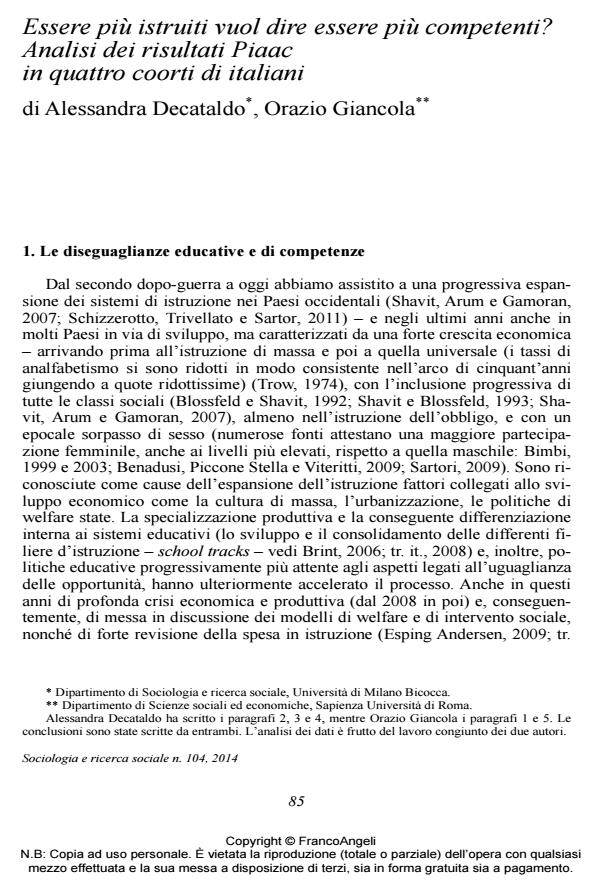Does Having an Education Mean Having Greater Competence? Analysis of the PIAAC Results in four Italian Cohorts
Journal title SOCIOLOGIA E RICERCA SOCIALE
Author/s Alessandra Decataldo, Orazio Giancola
Publishing Year 2014 Issue 2014/104
Language Italian Pages 29 P. 85-113 File size 197 KB
DOI 10.3280/SR2014-104005
DOI is like a bar code for intellectual property: to have more infomation
click here
Below, you can see the article first page
If you want to buy this article in PDF format, you can do it, following the instructions to buy download credits

FrancoAngeli is member of Publishers International Linking Association, Inc (PILA), a not-for-profit association which run the CrossRef service enabling links to and from online scholarly content.
This paper presents, a two-step analysis based on the new Piaac data (Programme for the International Assesment of Adult Population). Specifically: a) a study of the effects of ascriptive variables (as gender, parents’ education, etc.) on educational attainment in four age cohorts (born from 1946 to 1955, from 1956 to 1965, from 1966 to 1975 and from 1976 to 1985) aimed to produce an overview of the structure of educational inequalities over time; b) an analysis of the effect of the educational level when testing proficiency in reading skills (controlled by ascriptive variables and educational attainment). Thanks to the Piaac data features (which not only include background variables and the educational level, but also cognitive skills), this study aims to explore the advantage linked to the different educational levels on reading skills in the four age cohorts. Another goal of this essay is to analyse the influence of the ascriptive variables over the relationship between educational level and cognitive skills, in particular evaluating the effect of each of these independent variables and their dynamic over time.
- Disuguaglianze nel mercato del lavoro e transizione alla vita adulta. Una comparazione europea Orazio Giancola, Luca Salmieri, in SOCIOLOGIA DEL LAVORO 144/2016 pp.118
DOI: 10.3280/SL2016-144008 - Le “destinazioni educative” della Generazione X: risultati e disuguaglianze in una prospettiva generazionale Orazio Giancola, Matteo Bonanni, in Community Notebook. People, Education and Welfare in the Society 5.0 7/2024 pp.289
DOI: 10.61007/QdC.2023.3.163
Alessandra Decataldo, Orazio Giancola, Essere più istruiti vuol dire essere più competenti? Analisi dei risultati Piaac in quattro coorti di italiani in "SOCIOLOGIA E RICERCA SOCIALE " 104/2014, pp 85-113, DOI: 10.3280/SR2014-104005